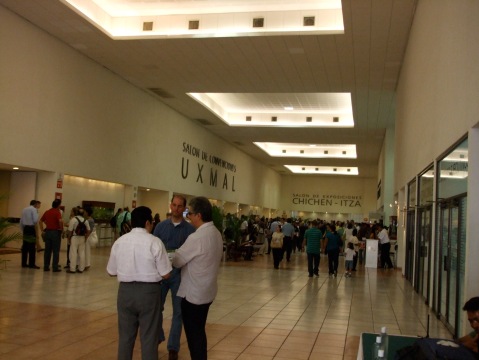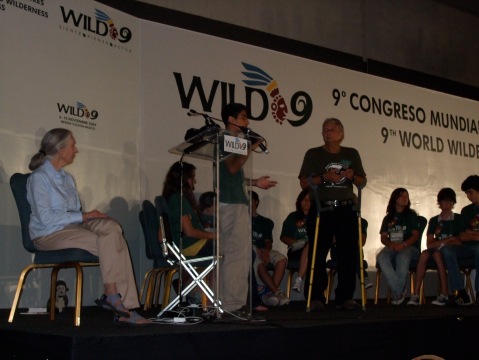Archive for the ‘wilderness’ Tag
WILD 9 Congress in Mérida
My last entry on this blog about Eugenia Leon is dated 4th August 2009, over three months ago. Since then I wrote two more entries – firstly about corruption and politics and then corruption and education – but removed those from the blog following the advise of a colleague at the university where I work.
Just before taking off the two posts about corruption, I had already decided to remove a previous post about a conflict over land on the Michoacán coast. My blog address was printed in a local paper in the area, together with translations of comments made by an American, which were being used as evidence of his meddling in the internal affairs of Mexico. Given the delicate, tense, potentially violent and complex nature of this situation, I decided to remove the post. I have to say I felt cowardly doing this. Interestingly, all my Mexican friends thought it was best to do so. A case of discretion being the better part of valour.
I then asked my colleague what she thought of the two posts about corruption and she advised me to remove them. Since then I have written nothing.
Coming to Mérida, however, to attend the 9th World Wilderness Congress has inspired me to get back onto the horse again. In this post I will write about the Congress and in another post(s) about some of the delights of Mérida.
The World Wilderness Congress (WWC), organised by the Wild Foundation, is held once every three or four years. It began in Africa in 1977, and this is the first time it is being held in Latin America.
The programme this year states that the WWC:
“Continues to work for a world in which a healthy and prosperous human society understands wilderness, and has an animated relationship with the complex biological, spiritual, cultural and economic benefits provided by wild nature”.
The first thing to say about this congress is that it is long! An initial event of three days from 6-8 November followed by another event of five days. I’m writing this on the second day of the second event. My impressions too are filtered through the bronchitis which I have been suffering from since I have arrived last Friday which maybe has made me somewhat jaded.
The congress has had a high profile this year. Mexican Presidente Felipe Calderon dropped in last Friday evening, and, Jim Prentice, the Canadian Minister for the environment gave a keynote speech. Dr Mario Molina, the Mexican Nobel prize winner for his work on chlorofluorocarbons in the atmosphere also gave a key note talk.
In addition, there was a strong corporate presence. Most of Saturday morning was given over to business presentations about work being done in their companies to address the environmental challenge. CEMEX, Coca Cola and Bimbo (a very large Mexican bakery company) were given platforms to show what they are doing.
CEMEX is actively involved in the creation of a wilderness area called El Carmen on the Mexico-Texas border. Coca Cola, through its Fundación Coca Cola is planting many trees throughout Mexico. Interestingly, it has also made a commitment to put back, every drop of water it uses to produce Coca Cola. It was not clear to me how they will do that. For example, the reforestation project is part of this. Bimbo has also created a civil society organization to be involved in reforestation projects.
There seem to me to be many contradictions in these huge companies giving their commitment to the conservation of wilderness. In an earlier post about Chiapas, I wrote how a Human Rights organization there was organizing the boycotting of Coca Cola products.
More fundamentally, however, I think questions need to be asked of these companies (Coca Cola and Bimbo) promoting themselves as, and winning awards for being, socially responsible businesses when it can be argued that their basic products do not promote healthy nutrition. Mexico is facing a health crisis due to an impending diabetes and obesity epidemic. I don’t think it is a coincidence that Mexico also has the highest rate per capita of consumption of Coca Cola in the world.
The main thrust of the conference, though, was given over to conservation of wilderness areas, with a particular focus on the possible effects of climate change. There were some remarkable and inspiring speakers, notably Dr Jane Goodall who especially talked about the work she is doing with young people, which goes under the name of Roots and Shoots.
Thomas Lovejoy gave a detailed account of some of nature’s response to climate change. Seeing this kind of presentation, with its wealth of evidence, painstaking and wide-ranging studies, made me wonder how anyone could not take climate change seriously. The conference was full of scientists and environmental activists, with a deep commitment to the work they are doing.
There were however aspects of the conference that made me uneasy.
• First from a learning point of view, the format was incredibly traditional. A series of key-note presentations for the first three days and even in the second week the workshop sessions in the afternoon seemed the modern equivalent of ‘chalk-and-talk’ – a sequence of powerpoint presentations. As Rob Hopkins commented in his recent Transition Town blog:
“For me the panels of speakers model is a bit past its sell by date at this stage, all the great gathered wisdom in the room, and we just all have to sit and listen to speakers all day. However good they are, it always feels like a missed opportunity to network, share ideas, discuss and find out the amazing things people are up to.”
• It seemed to me that very little conscious attention had been given to the need to create more space and opportunity for dialogue. Not easy with 1000 people, of course, but still possible. As always, people were networking like crazy in the coffee and lunch breaks, and renewing friendships and contact. But even a simple tool like a list of participants showing their organizational affiliations was not provided. I came to the conference hoping to meet more people in Mexico involved in environmental issues and it was not so easy to do this.
• The building where the conference was held, the Siglo XXI conference center in Mérida is incredibly ugly. To me it is the embodiment of a certain kind of Mexican monumental authoritarian neo-brutalist architecture – almost as far away from wild nature as you could get!
• The food was utterly conventional, over-priced, without taste, and generated vast quantities of plastic waste. What an opportunity missed to show-case the delights of Mexican food and maybe even find some small producers or local restaurants to show off what they could do. I appreciate this would be difficult but it seemed to me an incongruency in the organization of the event not at least to try and consider this aspect. For another perspective on how to green events, have a look at ecogatherings.
• In a similar vein, the tour company selling tickets to visit all the amazing Mayan and other architectural sites in this part of Mexico was a conventional tour company. In a conference, extolling the virtues of eco-tourism, could it not have been possible to try and find some local eco-tourism companies? I don’t underestimate the difficulties of doing this. I’m sure agreements exist between the conference center and the other businesses that are allowed to operate there. But I had a sense, maybe wrong, that the organisers of the conference had not considered this.
• Overall, all these points indicate to me a certain lack of imagination in the design of the conference. They help to reinforce a sense that it will be science (with its rational, materialistic underpinnings), closely followed by conventional economics, that would help get us out of the fix we are in. Everything is now being turned into a market. There was an afternoon session on the emerging markets in not just carbon credits, but also in biodiversity, fresh water and marine life. I understand the argument that it is important to value ecosystems and the services they provide, but I can’t help wondering that it is this kind of thinking and mindset that has created the problems we now face.
On reflection, this last point seems a little glib. I think the subject of the role of science and market-based solutions to the ecological crisis is complex. For a good critical outline of market-based solutions see Naomi Klein’s very recent article in the English newspaper the Guardian.
Better to end with Einstein’s quote that:
“In times of crisis the imagination is more important than knowledge”
 Comments (1)
Comments (1)


